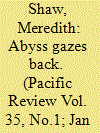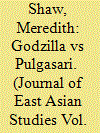| Srl | Item |
| 1 |
ID:
186108


|
|
|
|
|
| Summary/Abstract |
This article examines the ways in which the North Korean regime filters and re-interprets various ‘messages’ from the outside world for its domestic audience through the lens of state-produced literature. In broad strokes, I identify three main types of foreign interactions purported to send a ‘message’ to North Korea – economic sanctions, summit diplomacy and military exercises/fleet movements – and examine how these are treated in North Korean fiction produced by the Korean Writer’s Union, an important arm of the Party’s Propaganda and Agitation Department. Each of the three interaction types represents a formal effort by an outside government – typically the United States or its allies – to send a message to the regime or its people and thereby shape their behavior and/or perception of the outside world. By examining how these ‘messages’ are portrayed in North Korean fiction, we can gain insight into how the regime shapes internal narratives about foreign affairs, as well as what sort of alternative narratives it is most anxious to intercept or disrupt.
|
|
|
|
|
|
|
|
|
|
|
|
|
|
|
|
| 2 |
ID:
186563


|
|
|
|
|
| Summary/Abstract |
South Korea's persistent enmity towards its erstwhile colonizer Japan has been a compelling topic of East Asian international relations scholarship for decades. This article argues that the historical evolution of South Korea's democracy offers a vital and overlooked piece of this puzzle. Given that it emerged from one of the most virulently anti-communist dictatorships of the Cold War period, in a society facing an ongoing threat from communist North Korea, any left-of-center opposition movement faced an uphill battle against severe anti-communism. In such circumstances, the only way for a leftist opposition party to survive was by pitting its stronger anti-Japan reputation against conservatives’ anti-communism. After South Korea's democracy stabilized, liberals tried and failed to overturn the anti-leftist institutions left over from the Cold War and then sought equilibrium through parallel rhetoric targeting pro-Japanese elements. Today, neither left nor right can afford to allow a final amicable settlement with its respective target of antagonism. Through analyses of domestic political rhetoric targeting alleged pro-Japanese or pro-communist elements, this paper demonstrates how these competing antagonisms achieved an uneasy equilibrium that undergirds South Korean political dynamics to this day.
|
|
|
|
|
|
|
|
|
|
|
|
|
|
|
|